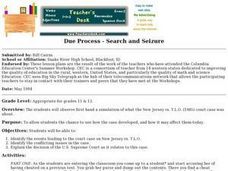Heritage Foundation
The Constitution, Federalism, and the States
The divide between federal and state government is responsible for much of tension that continues to this day, partly because of the US Constitution. The activities in the 14th lesson in a series of 20 are designed to help learners...
Heritage Foundation
Procedural Amendments: Amendments III, IV, and V
So many US Constitution clauses, so little time. The 17th installment in a 20-part series teaches pupils about the Third, Fourth, and Fifth Amendments. Learning through activities such as group work, connecting to current events, and...
Bill of Rights Institute
Preserving the Bill of Rights
Consider how America's founding fathers and their experiences contributed to the rights we all enjoy today. A collection of reading, writing, and collaborative exercises prompt high schoolers to think about the ways their current lives...
Curated OER
What Makes a Good Law?
Why were laws created? Spark a group discussion on why we need laws to co-exist. Should the sale of some things be outlawed on Sundays? Read a case summary between Target and the state of Minnesota that debated this issue. Ask your...
Curated OER
The Changing Meaning of "Due Process"
Learners examine the United States Constitution and how the application for due process differs in two amendments. They research the changing definition of the term since the Civil War. They use the internet to research press coverage of...
Curated OER
What's the Difference Between Procedural and Substantive Due Process?
High schoolers discuss the difference between substantive and procedural due process. They research the uses of due process on the internet and books. They also discuss cases involving students and due process.
Curated OER
What is Due Process Anyway?
Students examine the term due process and its historical origins. They compare and constrast the requirements of due process in the United States Constitution and the Indiana Constitution. They also discuss the difference between...
C-SPAN
Presidential Veto and Congressional Override
One of the key powers of the executive branch is the president's ability to pass or veto legislation proposed by Congress. Congress, the legislative branch, on the other hand, can override a president's veto. Five film clips show how the...
Constitutional Rights Foundation
The Role of the Judiciary
The role of the judicial branch has far reaches into American life. Learners consider its uses with a reading on the branch and a structured conversation on the topic. Together, they work to root their contributions to the discussion in...
Judicial Learning Center
The Power of Judicial Review
Marbury v. Madison is arguably the most important landmark case in the history of the Supreme Court. A fact-filled lesson provides background information about the case and two others related to the concept of judicial review. Scholars...
Judicial Learning Center
Your 4th Amendment Rights
Americans love to learn about their rights, especially those that protect them from the government's power to invade their privacy. Young people are especially engaged by this topic. An informative lesson explores four Supreme Court...
Judicial Learning Center
Why Study Landmark Cases?
Why study landmark Supreme court cases? A helpful lesson offers a brief but valuable argument for the importance of these cases in the field of criminology. It introduces scholars to some key terms necessary for studying court cases and...
Judicial Learning Center
Getting Ready for Trial
A courtroom can be a scary place for the uninitiated. Get familiar with the process using a helpful overview of the activities that take place prior to both civil and criminal cases. The lesson explains the differences between civil and...
Judicial Learning Center
Your Day in Court
Whether out of choice or necessity, people want to know what will happen on a typical day in court. A helpful lesson walks scholars in the field of criminology through the trial process from opening statements to the final verdict.
Judicial Learning Center
The Appeal Process
Why doesn't the Supreme Court hear testimony from witnesses? How do they complete an entire proceeding in less than two hours? A helpful lesson guides scholars of criminology through these and other questions by explaining how appeals...
Judicial Learning Center
The Players in the Courtroom
Courtrooms are complicated. In addition to the many rules, there are a number of people whose jobs are not very clear to the casual courtroom observer. With the resource, individuals identify some of these roles and review more...
Judicial Learning Center
The Constitution and Rights
What's the right way to teach young historians about the Bill of Rights? Many an instructor has asked this question when pondering lesson plans over the US Constitution. The Constitution and Rights is a nifty resource that provides a...
Judicial Learning Center
Your Day in Court: Criminal Justice
When a person goes on trial for a crime, what options does a court have to render justice? Who are the key players in the legal system? Interested legal scholars answer the inquiries and more using an Internet-based activity, chart, and...
School Improvement in Maryland
Supreme Court Case Overview I
As part of a study of the 14th Amendment to the United States Constitution, class members examine four Supreme Court decisions—Gitlow v. New York, Mapp v. Ohio, Gideon v. Wainwright, and Griswold v. Connecticut—that incorporated the due...
Curated OER
Due Process - Search and Seizure
Help your 11th and 12th graders gain a deeper understanding of Supreme Court decisions and law. The activities include role-play, research, and script writing that all focus on search and seizure laws pertaining to one particular case...
Curated OER
Due Process Freedoms
Students participate in a simulation of the voir dire portion of a trial. There are student lawyers assigned for the prosecution and the defense. They must review and question all prospective jurors to obtain a fair and impartial jury.
Curated OER
U.S. History Worksheet #73
Explore how the 14th Amendment changed the way the United States operated, both politicallay and socially. In this United States history worksheet, students utilize a word bank of 10 terms or phrases to answer 10 fill in the blank...
Curated OER
Mapp v. Ohio (1961)
Students examine warrantless searches and due process. In this Supreme Court lesson plan, students examine primary documents from Mapp v. Ohio and discuss the implications of the decision.
Curated OER
Dred Scott v. Sandford
Students examine the issues of slavery and due process. In this Supreme Court lesson, students examine primary documents from Dred Scott v. Sandford and discuss the implications of the decision.

























